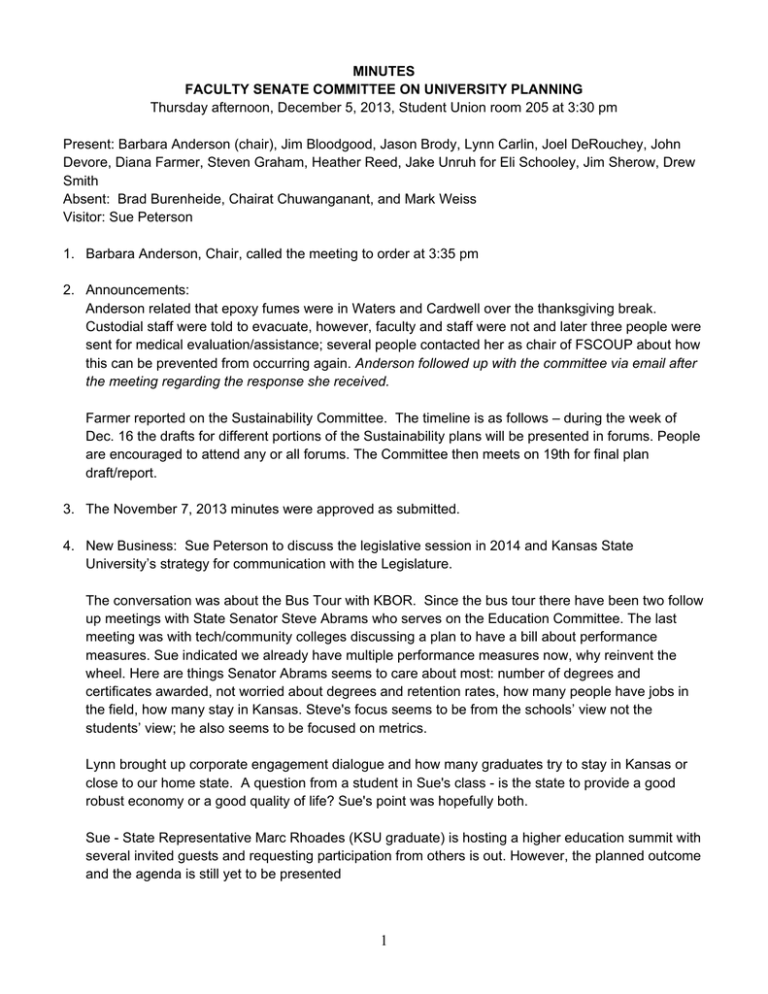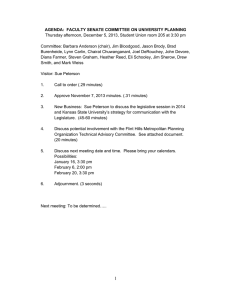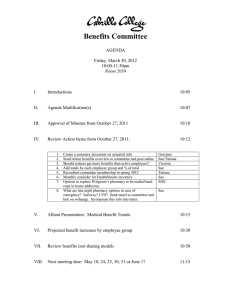MINUTES FACULTY SENATE COMMITTEE ON UNIVERSITY PLANNING
advertisement

MINUTES FACULTY SENATE COMMITTEE ON UNIVERSITY PLANNING Thursday afternoon, December 5, 2013, Student Union room 205 at 3:30 pm Present: Barbara Anderson (chair), Jim Bloodgood, Jason Brody, Lynn Carlin, Joel DeRouchey, John Devore, Diana Farmer, Steven Graham, Heather Reed, Jake Unruh for Eli Schooley, Jim Sherow, Drew Smith Absent: Brad Burenheide, Chairat Chuwanganant, and Mark Weiss Visitor: Sue Peterson 1. Barbara Anderson, Chair, called the meeting to order at 3:35 pm 2. Announcements: Anderson related that epoxy fumes were in Waters and Cardwell over the thanksgiving break. Custodial staff were told to evacuate, however, faculty and staff were not and later three people were sent for medical evaluation/assistance; several people contacted her as chair of FSCOUP about how this can be prevented from occurring again. Anderson followed up with the committee via email after the meeting regarding the response she received. Farmer reported on the Sustainability Committee. The timeline is as follows – during the week of Dec. 16 the drafts for different portions of the Sustainability plans will be presented in forums. People are encouraged to attend any or all forums. The Committee then meets on 19th for final plan draft/report. 3. The November 7, 2013 minutes were approved as submitted. 4. New Business: Sue Peterson to discuss the legislative session in 2014 and Kansas State University’s strategy for communication with the Legislature. The conversation was about the Bus Tour with KBOR. Since the bus tour there have been two follow up meetings with State Senator Steve Abrams who serves on the Education Committee. The last meeting was with tech/community colleges discussing a plan to have a bill about performance measures. Sue indicated we already have multiple performance measures now, why reinvent the wheel. Here are things Senator Abrams seems to care about most: number of degrees and certificates awarded, not worried about degrees and retention rates, how many people have jobs in the field, how many stay in Kansas. Steve's focus seems to be from the schools’ view not the students’ view; he also seems to be focused on metrics. Lynn brought up corporate engagement dialogue and how many graduates try to stay in Kansas or close to our home state. A question from a student in Sue's class - is the state to provide a good robust economy or a good quality of life? Sue's point was hopefully both. Sue - State Representative Marc Rhoades (KSU graduate) is hosting a higher education summit with several invited guests and requesting participation from others is out. However, the planned outcome and the agenda is still yet to be presented 1 Barbara had a question about degrees awarded at KSU. It looked like KSU awarded an appropriate proportion of undergraduate degrees but far fewer graduate degrees than KU. Lynn pointed out that this was true and an indicator that we were trying to change through our aspirations for graduate education under K-State 2025. Jim - our graduate programs do not have funding support like KU (Hall Center and much more private funding) which puts us at a greater disadvantage. Also our endowment structure is low in comparison to KU. KSU just has little or no financial resources to work with. Lynn - we need to build the endowments specifically to support endowed faculty, we are far short in doctoral assistance too. Jim S.- in liberal arts doctoral graduates are having a difficult time finding employment (slow economy/others hanging on to their jobs longer, changing economic times/unfunded positions). Barbara – shared from a First Tuesday Roundtable meeting with unit heads, Deans, and Central administration that certain terms such as "carryover" should never be used and with unit income as sporadic, academic units need to have cash to cash flow expenditures. She suggested using the term “cash reserves” but Sue pointed out that there were reasons that term would also not work with the legislature. How do we handle speaking about or defining the finances regarding both cash balances needed for cash flow and cash balances needed for designated projects, committed plans, dedicated money? Sue - the complete university budget was reviewed, and where specific money is put aside for specific needs identification of the specifics and base-line scenarios were noted. Sue - the complete legislature’s make-up is much different now and less experienced than before and therefore they have more questions. Our role is to continue to educate them about what we do and how we operate using state funding wisely. Joel - is there further discussion about taxing (taking over a preset cap) shifting excess funds away from other units to areas of financial need? Barbara indicated that at the First Tuesday Roundtable this week the Provost said "absolutely not". Steven - if you take student numbers and the amount of money spent to get money per student per academic program costs, this doesn't work. Programs are so varied and hard to compare (like apples to oranges) professors to students, tenured versus non-tenured, researchers versus teachers, adjuncts, higher workload doing more with less, sign of the times we’re all part of this discussion. Sue - internal and external tribal language is so important, and we need to get it right. She referred to the conversation Jeff Morris brought to FSCOUP in October and said that they were working on more clear communications with the legislature and external constituents. Joel - extension versus university (campus) activities, invite state reps/senators, they should always be invited to all KSU activities, two years ago students began paying more (tuition) than the state contributes now. 2 Steven suggest that we speak of that difference between student tuition and state support in a dollar amount ($50M) rather than a percentage of the total because it would be more impressive/carry more significance. Barbara - what are the upcoming hot items for the legislature this new year? Sue - this is an election year in the house, possible K-12 education financing bill, possible drone (UAS) bill, possible no more tenure bill. Sue said, if the K-12 decision is for the plaintiff, all bets are off regarding higher education funding in Kansas. 5. Discuss potential involvement with the Flint Hills Metropolitan Planning Organization Technical Advisory Committee. See attached document. Anderson inquired of committee members whether FSCOUP should be involved with this committee. The response was no, not at this time. 6. Discuss next meeting date and time. Committee members discussed the conflict in the next meeting time of 3:30 pm on February 6. It was determined to move the committee meeting to an earlier time that same day to avoid the conflict with the President Schulz’s open forum. Therefore, the meeting will begin at 2:00 pm on February 6. 7. Other: Graham asked what the 8020 committee is and why is it named that? It is the code on committee list, hence the name assignment, this Committee does the Pizza & Politics, Cats on the Capitol (this year set up booths with 150 year celebration ask legislators come to the set up locations on the rotunda floor). Barbara - will ask Cindy for the budget spreadsheet that Sue mentioned. Jim S.- what is our role in budget? Barbara - we (FSCOUP) have a role in all areas of university operations. She said she would send information about our charge and financial exigency, which is an issue we might want to brush up on in case it comes to that as the budget reallocations continue. What areas do you feel we need to look into, and who do we invite to our committee next? Jim S.- shared his two priorities (1) move forward on encouraging a vision and plan for the Marlatt house (2) from previous city work, felt we should inquire into the suspected unreported rape problem in Aggieville. 8. The meeting was adjourned at 4:57 pm Next meeting: February 6, 2:00 pm, Union room 205 3

